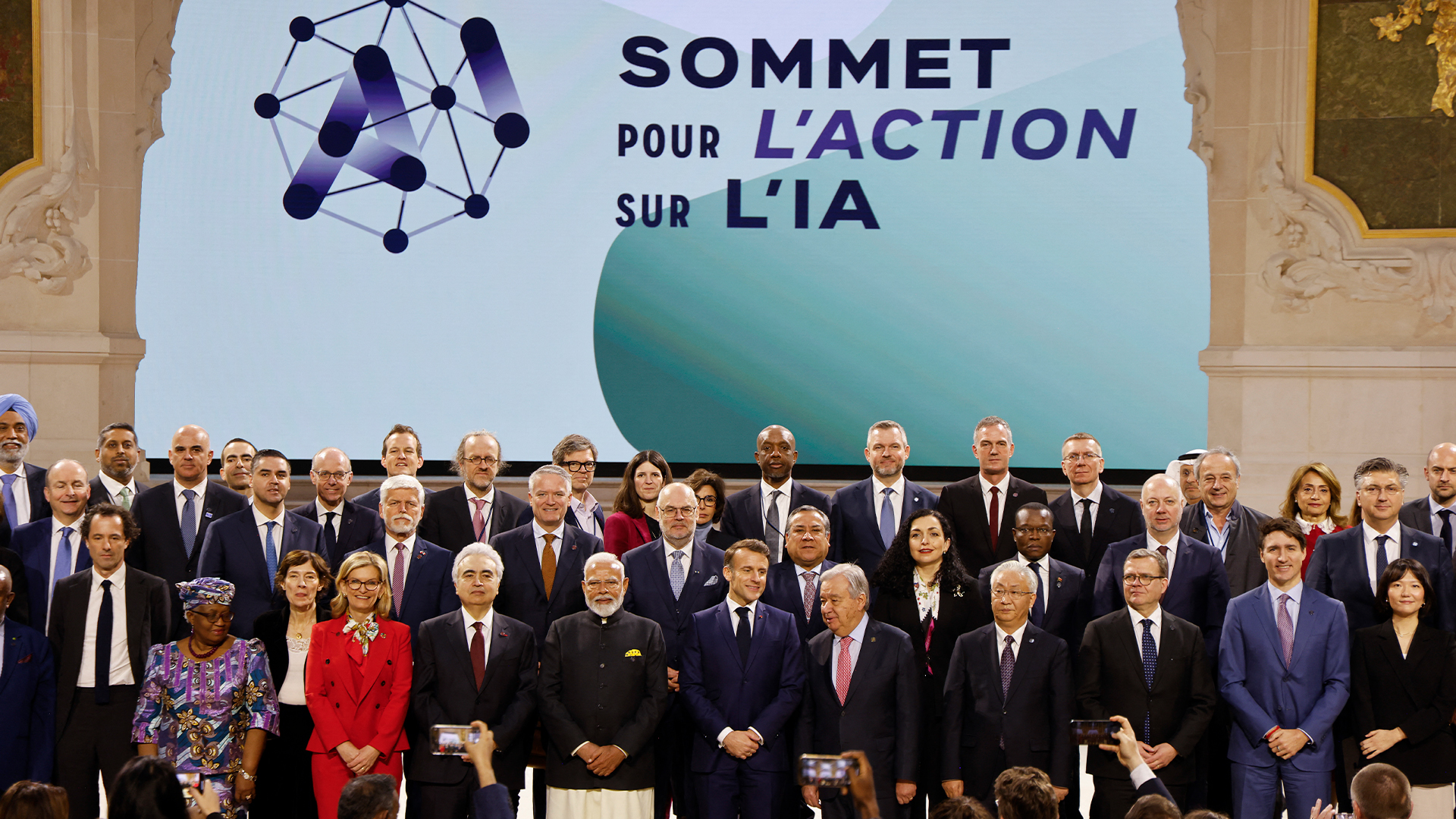UK and US reject Paris AI summit agreement as “Atlantic rift” on regulation grows
The UK believes the declaration is too vague, while the US wants to put American interests first


The UK and US have refused to sign an international agreement on inclusive and sustainable AI at this week's global summit in Paris.
The UK said its decision was based on concerns that the declaration lacked 'practical clarity' on global governance and didn't address issues of national security.
Meanwhile, US vice president JD Vance told delegates to the summit that over-regulation of AI could hold the industry back.
"The Trump administration believes that AI will have countless revolutionary applications in economic innovation, job creation, national security, health care, free expression and beyond, and to restrict its development now will not only unfairly benefit incumbents in this space, it would mean paralyzing one of the most promising technologies we have seen in generations," he said.
Vance's speech was very much in line with the Trump policy of 'America First'. He beat the drum for the US AI industry, and issued a warning to nations aiming to restrict its power.
"The Trump administration is troubled by reports that some foreign governments are considering tightening screws on US tech companies with international footprints," he said.
"America cannot and will not accept that, and we think it's a terrible mistake."
Get the ITPro daily newsletter
Sign up today and you will receive a free copy of our Future Focus 2025 report - the leading guidance on AI, cybersecurity and other IT challenges as per 700+ senior executives
Vance's stance has been widely criticized by rights groups.
Alexandra Reeve Givens, CEO of the Center for Democracy and Technology (CDT), said that for AI to benefit both nations and individuals, robust safeguards and accountability must be implemented.
"When AI is being used to determine who gets a job, who gets a loan, who gets access to government services, the stakes are too high to shrug off the risks."
Meanwhile, Dr Andrew Bolster, senior research and development manager for data science at Black Duck, warned that the lack of transatlantic agreement might leave organizations deploying AI with a tricky course to steer.
"This growing Atlantic AI rift is a wake-up call for any organization looking to deploy or operate global AI solutions," he said.
"The regulatory landscape is not as settled as it may seem, and while alignment to existing principles such as GDPR, the California Consumer Privacy Act (CCPA) - and its amendment, the California Privacy Rights Act (CPRA) - or Australia’s Privacy Act may stand you in good stead, that is no guarantee of continued operations."
61 nations still signed the AI agreement
Despite the UK and US’ disapproval, the agreement was signed by 61 other countries, including Canada, Japan, India ,and China, as well as European nations.
They pledged to focus on ensuring that AI is 'open, inclusive, transparent, ethical, safe, secure and trustworthy'.
The agreement also stresses the importance of strengthening international coordination in AI governance and preventing market monopolization, along with working to keep AI sustainable.
RELATED WHITEPAPER

During the summit, European Commission president Ursula von der Leyen announced a €200 billion plan to advance AI research and infrastructure across the bloc.
InvestAI will finance four AI gigafactories across the EU focused on training models for complex applications such as medicine and science.
"This unique public-private partnership, akin to a CERN for AI, will enable all our scientists and companies – not just the biggest – to develop the most advanced very large models needed to make Europe an AI continent," she said.
MORE FROM ITPRO
- A big enforcement deadline for the EU AI Act just passed
- How the EU AI Act compares to other international legislation
- Looking to use DeepSeek R1 in the EU? Maybe think again
Emma Woollacott is a freelance journalist writing for publications including the BBC, Private Eye, Forbes, Raconteur and specialist technology titles.
-
 Bigger salaries, more burnout: Is the CISO role in crisis?
Bigger salaries, more burnout: Is the CISO role in crisis?In-depth CISOs are more stressed than ever before – but why is this and what can be done?
By Kate O'Flaherty Published
-
 Cheap cyber crime kits can be bought on the dark web for less than $25
Cheap cyber crime kits can be bought on the dark web for less than $25News Research from NordVPN shows phishing kits are now widely available on the dark web and via messaging apps like Telegram, and are often selling for less than $25.
By Emma Woollacott Published
-
 Meta executive denies hyping up Llama 4 benchmark scores – but what can users expect from the new models?
Meta executive denies hyping up Llama 4 benchmark scores – but what can users expect from the new models?News A senior figure at Meta has denied claims that the tech giant boosted performance metrics for its new Llama 4 AI model range following rumors online.
By Nicole Kobie Published
-
 Fake it till you make it: 79% of tech workers pretend to know more about AI than they do – and executives are the worst offenders
Fake it till you make it: 79% of tech workers pretend to know more about AI than they do – and executives are the worst offendersNews Tech industry workers are exaggerating their AI knowledge and skills capabilities, and executives are among the worst offenders, new research shows.
By Nicole Kobie Published
-
 Sourcetable, a startup behind a ‘self-driving spreadsheet’ tool, wants to replicate the vibe coding trend for data analysts
Sourcetable, a startup behind a ‘self-driving spreadsheet’ tool, wants to replicate the vibe coding trend for data analystsNews Sourcetable, a startup developing what it’s dubbed the world’s first ‘self-driving spreadsheet’, has raised $4.3 million in funding to transform data analysis.
By Ross Kelly Published
-
 DeepSeek and Anthropic have a long way to go to catch ChatGPT: OpenAI's flagship chatbot is still far and away the most popular AI tool in offices globally
DeepSeek and Anthropic have a long way to go to catch ChatGPT: OpenAI's flagship chatbot is still far and away the most popular AI tool in offices globallyNews ChatGPT remains the most popular AI tool among office workers globally, research shows, despite a rising number of competitor options available to users.
By Ross Kelly Published
-
 ‘DIY’ agent platforms are big tech’s latest gambit to drive AI adoption
‘DIY’ agent platforms are big tech’s latest gambit to drive AI adoptionAnalysis The rise of 'DIY' agentic AI development platforms could enable big tech providers to drive AI adoption rates.
By George Fitzmaurice Published
-
 Fit for artificial intelligence
Fit for artificial intelligencewhitepaper Ensure data availability to applications and services with hybrid cloud storage
By ITPro Published
-
 Fit for AI
Fit for AIwhitepaper Ensure data availability to applications and services with hybrid cloud storage
By ITPro Published
-
 'Customers have been begging us to launch': AWS just rolled out Amazon Q Business in Europe – and it includes new data residency features
'Customers have been begging us to launch': AWS just rolled out Amazon Q Business in Europe – and it includes new data residency featuresNews AWS has announced the availability of its Amazon Q Business platform in Europe in a move sure to please sovereignty-conscious customers.
By George Fitzmaurice Published